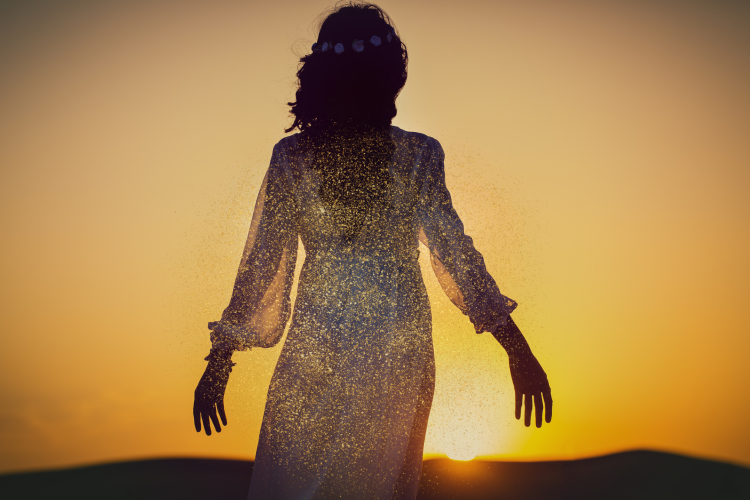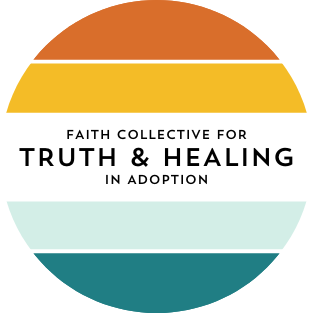The God Who Sees Me
By Amber Jimerson

As a preacher’s wife, I’ve spent at least two days a week every week for over 13 years in our church, and more than that with our church family. Throughout the years, birth mothers I’ve met through the adoption community have told me variations of the sentiment: I don’t know how you do it. I don’t know how you stay. Though their stories are infinitely diverse, their words reflect past personal experience of hurt, mistreatment, and harsh judgment.
These experiences remind me of when I was tasked with teaching a chapter for our Sunday morning ladies’ Bible class. The chapter’s focus was Hagar. As a birth mother, I had often found Hagar more relatable than Sarah, but until this class I’d not studied her character or the story in any depth.
This is a story that has nothing to do with adoption, and yet as a birth mother, I see myself in Hagar and I see adoption-adjacent themes like surrogacy, competition between mothers, undeservedness, judgment, powerlessness, and infertility. I see a desperate woman with little agency in an impossible situation. And I see a God who sees Hagar in her mistreatment and outsider status, and promises his presence and active provision. Ha-ger is The Stranger, a part of the vulnerable quartet: the stranger, the poor, and, of course, the widow and orphan (the single mother and her child). In that way, her story feels linked to mine.
Hagar was the Egyptian slave of Abram and Sarai. The couple used Hagar to conceive a child, as Sarai was older and presumed to be infertile. Genesis 16 is where we meet Hagar, with Sarai delivering her to Abram to conceive, likely against her will:
When Hagar saw that she had conceived, she looked with contempt on her mistress.
And Sarai said to Abram, ‘May the wrong done to me be on you! I gave my servant to your embrace, and when she saw that she had conceived, she looked on me with contempt. May the Lord judge between you and me!’ But Abram said to Sarai, ‘Behold, your servant is in your power; do to her as you please.’
Then Sarai dealt harshly with her, and she fled from her.
At this point we see Hagar fleeing into the wilderness, where an angel of the Lord finds her by a spring. He inquires of her and ultimately says to return to Sarai, promising that her offspring will be multiplied. He gives a prophetic word about her son: “You shall call his name Ishmael, because the Lord has listened to your affliction. He shall be a wild donkey of a man, his hand against everyone and everyone’s hand against him, and he shall dwell over all his kinsmen.”
The text reveals that at this word, Hagar feels utterly seen by God, and that she has seen the one who looks after her, El Roi, The God Who Sees Me.
Some years later, God appears to Abram to bestow upon he and Sarai new names, to establish a covenant and reaffirm his promises, specifying that these generations would not come through Ishmael, but through a son borne by Sarah. Many other adventures take place until chapter 21, where Sarah finally conceives and gives birth to Isaac, which means laughter, saying, “God has made laughter for me; everyone who hears will laugh over me…who would have said to Abraham that Sarah would nurse children? Yet I have borne him a son in his old age.”
As Isaac grows, tension becomes clear between the brothers and the mothers, and this time Hagar is cast out into the wilderness, not of her own accord but by Sarah’s hand. Sarah tells Abraham, “Cast out this slave woman with her son, for the son of this slave woman shall not be heir with my son Isaac.” So Abraham rises in the morning, with some bread and water and sends Hagar and Ishmael away, with language that intriguingly mirrors the sacrifice of Isaac, the Akedah. Shortly after, we see that the two run out of water. Hagar hides Ishmael under a bush and she sits afar off, weeping, so that she won’t have to watch her son die. Again, an angel of the Lord sees her and offers words of comfort, lifting her eyes to show her a well, and reiterating the promises that a great nation will come from Ishmael. “And God was with the boy, and he grew up.”
Hagar is an Egyptian essentially enslaved by the founders of the faith, a subtle reversal of what will become prominent themes in Israel’s history: their many years as strangers in the land, and their historic oppression by Egypt. She is not only Abraham and Sarah’s slave, but the text refers to her terrible mistreatment, shining an unabashedly unflattering light on the matriarch Sarah. Even the word used to describe her suffering under Sarah is the same word used to describe the oppression of the Hebrews in Egypt. Maybe these reversals aren’t so subtle, but are intentional. Tikva Frymer-Kensky words it in this way: “The story of Hagar parallels the story of Israel; she is the archetype. The pattern of Hagar and Abram and of later Israel shows that the way to God’s reward is through the margins of society and the depths of degradation.”
Hagar is a stranger in the land of Canaan. She is the one oppressed by God’s people. She is the reminder that we all have the capacity to become the oppressors, and most of all, that God hears and sees the cries of the abused and forsaken. Tucked within the epics of Israel’s history are many such glimpses of the unexpected, upside-down ways in which God is with the non-elect just as much as he is with his elect; that he is present and active in ways his own people routinely fail to anticipate.
In fact, the only person to give a name to God in the Bible is this foreign slave woman, Hagar. And God’s promise to her is that her son will be the inverse of her plight with Sarai: he will be free and untamed, not easily subjugated. He will be the opposite of a slave. This promise changes her demeanor towards God; this promise makes her feel utterly seen. She seems to trust this God who was not her own, this God of Sarah and Abraham.
This is a story full of infinitely more layers that could, and have, kept scholars and believers intrigued and debating for years. And to many, like the birth mothers I have met in the adoption community, the church seems safe only for Sarah’s. I am grateful that I cannot say this has been my experience, that I have been met with curiosity and sincerity and softness from those in our congregation, even if not everyone has understood (how could they?), and even if we have disagreed (why wouldn’t we?), and even if some resonate more deeply with the story of Sarah, who cannot be reduced to her flaws. I am grateful that I am part of a congregation which has a heart for those on the margins, that we often feel like a motley church of imperfect Christians who have come together to heal from past hurts, whatever they may be. When we are loving those on the margins, we are in tune with the thrust of scripture, for everywhere God reminds us that he hears their cries, sees their suffering, takes care of them, and warns against increasing their plight.
When we have mercy on the strangers, the fatherless, the widow, the poor, we are acting out God’s upside-down vision.
We are partaking in His story, and we are remembering our common humanity. We are remembering that Hagar’s and Sarah’s and Abraham’s and ourselves and our neighbors, adoptees, and birth mothers, and adoptive parents, are not one-dimensional characters, but humans full of failures and desires and strengths and weaknesses.
And when we find ourselves collapsed in the wilderness in tears, whoever we are, may we remember that we are in the presence of a God Who Sees.

